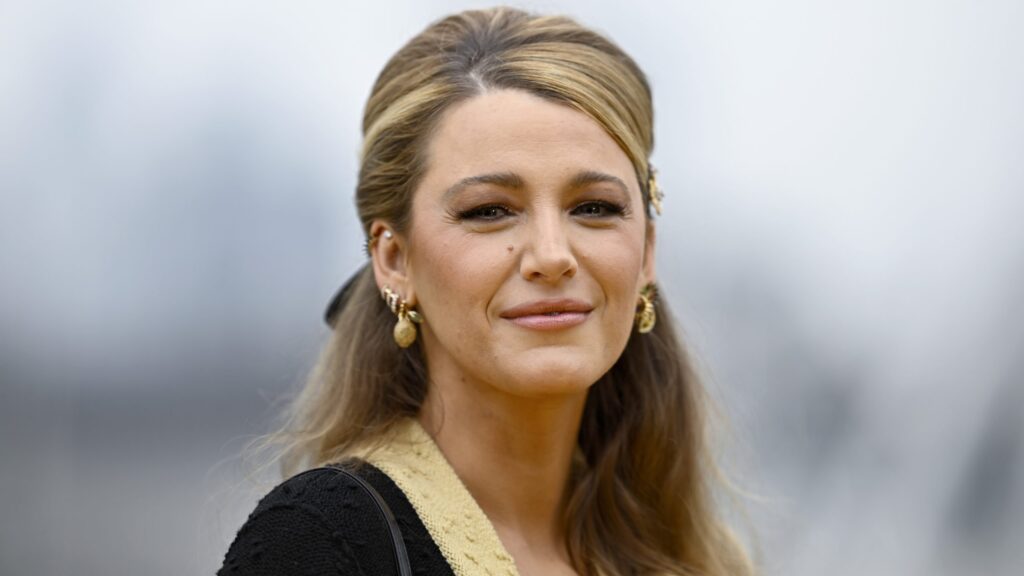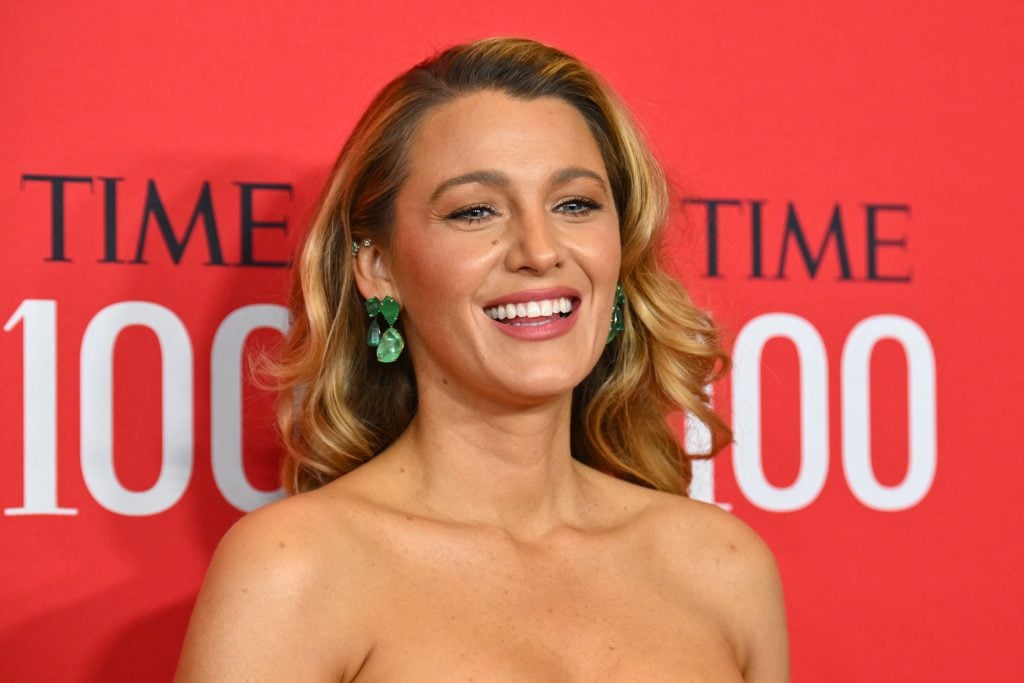
Blake Lively attends the “Another Simple Favour” photocall at the Corinthia Hotel on April 15, 2025.<span class="image-caption-credit"> (Photo Credit: Gareth Cattermole/Gareth Cattermole/Getty Images)</span>
Blake Lively Faces Online Backlash Over Controversial “Another Simple Favor” Plot Twist
Blake Lively attends the “Another Simple Favour” photocall at the Corinthia Hotel on April 15, 2025. (Photo Credit: Gareth Cattermole/Getty Images)
Table of Contents
About “Another Simple Favor” and the Controversy
Blake Lively is facing a wave of online criticism following the release of her latest film, “Another Simple Favor” on Amazon Prime Video. The movie, which premiered on May 1, 2025, serves as a sequel to the 2018 thriller “A Simple Favor,” reuniting Lively with co-star Anna Kendrick.
In the film, Lively portrays fashion PR director Emily Nelson, but the controversy stems from a plot twist involving her character. As the story unfolds, it’s revealed that Emily is actually a triplet, and Lively also plays the role of Emily’s sister, Charity. Through the use of modern film technology, camera techniques, and digital effects, Lively appears in scenes where these two characters interact in ways that some viewers have found controversial.
Film Context:
The controversial scenes in question feature Lively’s two characters engaging in taboo interactions, including passionate kisses and intimate touching between the fictional sisters. These scenes serve as a plot device in the thriller’s narrative but have sparked debate among viewers about the appropriateness of such content.
This sequel expands on the twists and turns established in the original film, pushing boundaries with its provocative storyline. While the premise involves fictional characters in fictional scenarios, the taboo nature of the portrayed relationships has become a flashpoint for criticism online, with much of this criticism directed at Lively personally rather than at the film’s writers, directors, or producers.

Blake Lively attends “Another Simple Favor” New York Screening at Jazz at Lincoln Center on April 27, 2025. (Photo Credit: Michael Loccisano/Getty Images)
Online Reactions and Social Media Backlash
The release of “Another Simple Favor” on Prime Video has triggered an intense wave of reactions across social media platforms. While the film has received mixed reviews for various aspects of its storytelling and execution, the scenes depicting taboo relationships between Lively’s characters have become the central focus of the online discourse.
It’s worth noting that depictions of controversial or taboo subjects in fiction are not new to film or television. Recent hit shows like “Game of Thrones,” “House of the Dragon,” and “The White Lotus” have all featured similar themes, often as plot devices or character development elements. However, the public reaction to “Another Simple Favor” has been particularly targeted at Lively herself.
Perspective:
Many entertainment analysts note that fictional portrayals of taboo subjects serve different purposes in storytelling, from creating tension and drama to exploring complex moral questions or simply generating controversy. These elements have long been part of film and television without necessarily endorsing the portrayed behaviors.
The backlash against the film ranges from legitimate critique of its artistic merits to more concerning reactions, including personal attacks against Lively, conspiracy theories about Hollywood’s intentions, and in some cases, thinly veiled threats disguised as hyperbolic criticism.
Notable Critical Reactions on Social Media
The social media response to “Another Simple Favor” has been swift and, in many cases, harsh. Twitter (now X) has been a particular hotbed for criticism, with numerous posts expressing everything from mild disappointment to outrage about the film’s content:
This particular tweet exemplifies a common thread in the criticism—the conflation of fictional portrayals with real-world advocacy or endorsement. The suggestion that “Hollywood is pushing” taboo content implies an agenda beyond storytelling, a sentiment echoed in other critical posts.
Other posts took an even more concerning tone, with one user ominously stating: “Another simple favour is the strangest incest-filled movie i have ever watched. Blake Lively you will be dealt with.” While likely hyperbolic rather than an actual threat, such language highlights the intensity of some viewers’ reactions.
The Divide Between Fiction and Reality in Media Consumption
The backlash against “Another Simple Favor” raises important questions about how audiences engage with fictional content and the distinction many viewers make—or fail to make—between fictional portrayals and real-world behavior or endorsements.
Most media consumers understand that actors portraying murderers in films are not themselves murderers, and that playing a villain doesn’t make an actor evil. Yet when it comes to certain taboo subjects, this distinction sometimes collapses in public discourse, with actors being held personally responsible for the actions of their fictional characters.
Media Literacy:
Understanding that actors, directors, and writers can explore controversial themes in fiction without endorsing them in reality is a fundamental aspect of media literacy. Entertainment often deals with complex, uncomfortable, or even taboo subjects as a way to explore human psychology and societal boundaries.
This phenomenon is not limited to “Another Simple Favor” or Blake Lively. Throughout entertainment history, actors have faced personal criticism for the roles they play or the content of their films. However, social media has amplified these reactions and created new platforms for criticism to spread rapidly and widely.

Actress Blake Lively attends the 2025 TIME100 gala at The Jazz at Lincoln Center in New York, April 24, 2025. (Photo Credit: ANGELA WEISS/AFP via Getty Images)
Understanding Online Purity Culture and Media Criticism
The reaction to “Another Simple Favor” exemplifies a growing phenomenon in online spaces that media scholars and cultural critics have identified as “digital purity culture” or “moral absolutism in media consumption.” This approach to entertainment applies strict moral judgments to fictional content and, by extension, to the creators and performers involved.
Online communities, particularly among younger users, have developed terms for this behavior, including “fandom antis,” “puriteens,” and “2D morality police.” These groups apply real-world ethical standards to fictional scenarios and often fail to distinguish between depicting a behavior and endorsing it.
This perspective stands in contrast to how most adult media consumers approach entertainment. For many viewers, works like “House of the Dragon” or “The White Lotus” are understood to depict complex, sometimes morally ambiguous or even reprehensible behaviors without presenting them as ideal or aspirational. The understanding that fiction serves purposes beyond moral instruction—including exploration of taboo subjects, character development, or plot advancement—is fundamental to mature media consumption.
| Traditional Media Viewing | Online Purity Culture Approach |
|---|---|
| Distinguishes between fictional portrayal and endorsement | Treats fictional portrayal as equivalent to endorsement |
| Judges content on artistic, narrative, and entertainment merits | Judges content primarily on moral alignment with viewer’s values |
| Understands that exploring taboo subjects can serve storytelling | Views inclusion of taboo subjects as automatically problematic |
| Separates criticism of content from personal attacks on creators | Often conflates content with the moral character of creators |
Why Blake Lively Became the Target
The concentration of criticism on Blake Lively personally, rather than on the film’s writers, directors, or producers, represents an interesting case study in how online backlash forms and focuses. Several factors may contribute to Lively becoming the primary target:
- Visibility: As the star of the film and a high-profile celebrity, Lively naturally receives more attention than other creative personnel involved.
- Current Controversies: Lively is reportedly involved in a separate legal dispute with co-star Justin Baldoni, making her a more vulnerable target at this particular moment.
- Gender Dynamics: Female celebrities often face harsher criticism for controversial content than their male counterparts.
- Dual Role: The technical aspect of Lively playing both characters involved in the controversial scenes makes her performance particularly central to the criticism.
Media Impact:
The targeting of actors for fictional portrayals can have real consequences, including psychological impact, professional repercussions, and in extreme cases, safety concerns when online criticism escalates to threats or harassment.
The backlash against “Another Simple Favor” and Blake Lively specifically highlights broader issues in modern media consumption, including the blurring of lines between fiction and reality, the impact of social media on criticism, and the sometimes irrational ways in which online discourse assigns blame or responsibility for creative content.
As viewers continue to engage with increasingly complex and boundary-pushing entertainment, the conversation around how we consume, critique, and discuss controversial fictional content remains important. Understanding the distinction between portraying controversial behaviors in fiction and endorsing those behaviors in reality is crucial for meaningful media criticism and discussions about artistic expression.
Published on May 8, 2025







